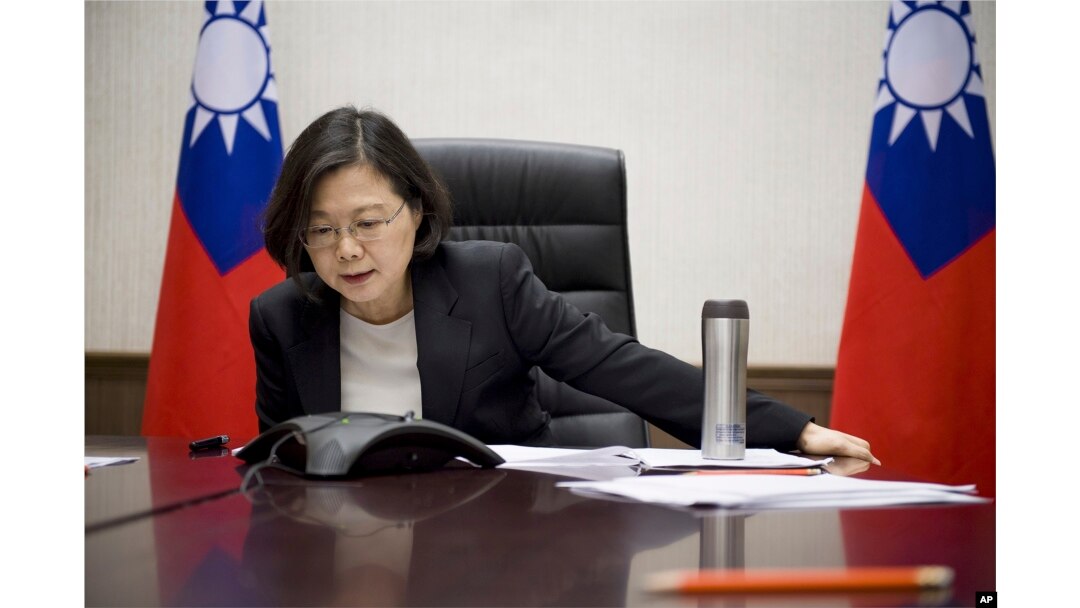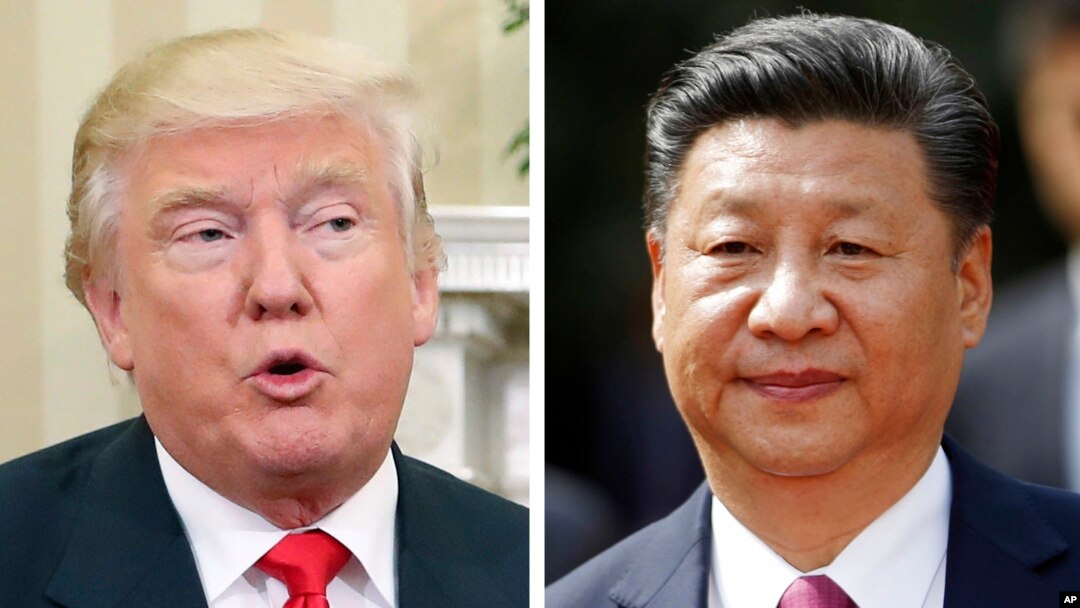Many in China initially welcomed the election of Donald Trump as the next president of the United States, viewing it as a win for Beijing and believing that as a businessman his approach would be more straightforward than that of his opponent.
But a phone call and a few tweets later, that view is starting to change as many realize Trump's presidency may not be as predictable as some originally hoped. And talk about possible diplomatic and economic blowback from Beijing is growing.
On Friday, President-elect Trump broke with decades of diplomatic tip-toeing and spoke directly with Taiwan’s President Tsai Ing-wen on the phone. The call shocked Beijing not only because Trump was the first president-elect to make such a call, but also because in his tweet, Trump referred to her as the President of Taiwan.

Taiwan's President Tsai Ing-wen speaks with U.S. President-elect Donald Trump through a speaker phone in Taipei, Taiwan. (Taiwan Presidential Office via AP)
The United States switched diplomatic ties to Beijing in 1979, and China claims the democratically-ruled island as part of its own territory. Under agreements made as part of that shift in diplomatic recognition, Washington agreed to cut political ties with Taiwan.
In Washington, White House spokesman Josh Earnest said Monday that U.S. officials are in touch with Beijing to reiterate the One China policy after Trump's recent phone call.
WATCH: Earnest on Trump's contact with Taiwan
Your browser doesn’t support HTML5
Earnest on Trump's Contact with Taiwan
But just as Beijing was recovering from last Friday's assault on its diplomatic senses, Trump released two more tweets early Monday, Beijing time.
“Did China ask us if it was OK to devalue their currency (making it hard for our companies to compete), heavily tax our products going into..” he said in one tweet and continued in another… “their country (the U.S. doesn’t tax them) or to build a massive military complex in the middle of the South China Sea? I don’t think so!”
Google Map image of Taiping Island in the South China Sea, Sept. 22, 2016.
Back to reality
Wang Dong, a political science professor at Peking University says Trump’s tweets appear to be “bluffing” and in line with his purported ability as a good negotiator. But, he adds, it is also clear Trump is surrounding himself with individuals in the Republican Party who have hawkish views on China.
“And I think that gives us reason to be worried about U.S.-China relations going forward,” Wang said. “There has been too much wishful thinking and overly optimistic expectations about Donald Trump in China, and I think that people now have to come back to reality.”
Stephen Yates, a China expert who was deputy national security advisor to former Vice President Dick Cheney, tells VOA the call's timing makes it less diplomatically consequential.
“Before the power handover, we only have one president: Obama," Yates told VOA's Mandarin Service, during an interview in Mandarin. "President-elect Trump talked on the phone with several foreign leaders to establish personal relationships, not to talk about big policy issues, nor to negotiate any political agenda for the United States. It is important for Trump to have some personal relationship with these leaders, but we will not know his actual policies until after his entry into the White House."
Yates, a Trump supporter and chairman of the Idaho Republican Party, emphasized what he calls Trump's clear distinction between “substantive strategic issues and symbolic topics.”
“Answering the phone is just a symbolic topic, but when Trump mentioned the sale of defense weapons and the threat of China in his Twitter, it is a very practical consideration," Yates said. “Perhaps his Taiwan policy will become a challenge to the Taiwanese government, but he will represent a greater political challenge for the leaders of mainland China. The next U.S. government will adopt a very competitive attitude when conducting trade and financial negotiations with China.”
Former Deputy Secretary of State Richard Armitage, another official who served under former President George W. Bush, also downplayed the call's potential diplomatic fallout. Expressing praise for President Tsai, he called it too soon to anticipate the call's long-term impact on U.S.-China policy.
“There wasn’t any protocol [to violate], actually. ... To say that there was a protocol in existence is too strong," he told VOA. "You'll remember that in the first couple of days of President Ronald Reagan's [administration], he invited a delegation from Taiwan to attend his inauguration. We've had interesting developments between Taiwan and China, and between the U.S. and Taiwan, for years."
Ambassador Christopher Hill, former Assistant Secretary of State for East Asia and Pacific Affairs, expressed fear, however, that the phone call only underscore's Trump's lack of detailed knowledge of one China policy.
“He is obviously familiar with the One China policy [and] familiar with the Taiwan Relations Act (TRA), but maybe not all the details," Hill said. "He has a million things he has to focus on, so I think the real test of these will be after he becomes president, whether there will be any changes. My own view is that our one China policy and TRA have worked very well. There are other things that are in immediate need of change ... [and this isn't] one of them.”
Stern representations
So far, Beijing has kept criticism of Trump to a minimum, and China’s response to the call has been less harsh than many had anticipated. China’s Foreign Minister has called the phone conversation nothing more than a “petty trick” by Taiwan. It has also issued “stern representations” to “relevant parties” in the United States and the U.S. embassy in Beijing.
At a regular briefing Monday, the first since the phone call, Foreign Ministry spokesman Lu Kang did not make any additional statements about the incident nor did he comment directly on Trump’s recent tweets — including his first about the touchy South China Sea issue.
Lu said the Trump transition team was clear about China’s position regarding the phone call with Taiwan President Tsai Ing-wen, and said Beijing has been in touch with the president-elect’s team. Lu did not state explicitly whether a call had been made to the team after Trump and Tsai spoke.
FILE -Chinese Foreign Ministry spokesman Lu Kang.
Lu talked about the benefits of the U.S.-China relationship and Taiwan from Beijing’s perspective, calling it the “most important” and “most sensitive” issue.
The proper handling of the Taiwan issue, he said, “is an important political pre-condition that has helped ensure the continual and healthy development of U.S.-China relations and allows the continued development of mutually beneficial relations.”
Richard Bush, a senior fellow at the Washington-based Brookings Institution who once directed the American Institute in Taiwan, an organization established under the auspices of the United States government to serve its interests in Taiwan, says Beijing is in a position to handle the Trump/Tsai call one of two ways.
"It can tolerate this for the sake of having a good relationship with the U.S., [because], technically, Trump is a private citizen, so this is not an interaction between officials of the two governments," he told VOA. "Or it can regard this as the first step of creeping officiality and decide that it has to 'kill the monkey to scare the chickens.' Playing into this choice are perceptions of relative power; perceptions of Taiwan's vulnerability, and its approach to risk.”
FILE - front page of a Chinese newspaper with a photo of U.S. President-elect Donald Trump and the headline "Outsider counter attack" is displayed at a newsstand in Beijing, China.
Trump contingencies
Communist-backed state media have been more blunt and direct in their criticisms of Trump, arguing that his decision to speak with Tsai was a sign of his “inexperience” and lack of understanding of the sensitive nature of China’s views regarding Taiwan.
The nationalistic Global Times urged the government to do more, but to keep the focus on Tsai and her new government for now.
China “can let Taiwan lose one or two diplomatic allies as a punishment as well as a warning.” It also argued that Beijing could strengthen its military deployments in case Taiwan makes any moves toward independence.
At the same time, though, the newspaper argued that China needs to be tactful and skillful in dealing with Trump, adding that it “should understand that Trump has two faces.”
“On the one hand he is bluffing and unpredictable, and on the other, he has no plan to overturn international relationships, and will focus on U.S. internal affairs to “make America great again,” it argued.
Assumptions aside, no one knows for sure how Trump’s approach will be different and what he may eventually do when in office. And because of that, China needs to prepare policies regarding the currency and even the South China Sea, said Peking University’s Wang Dong.
“China would be well advised to make preparations for contingencies,” Wang said.
Daphne Fan, Abby Sun and Li Ya of VOA's Mandarin Service contributed to this report.


